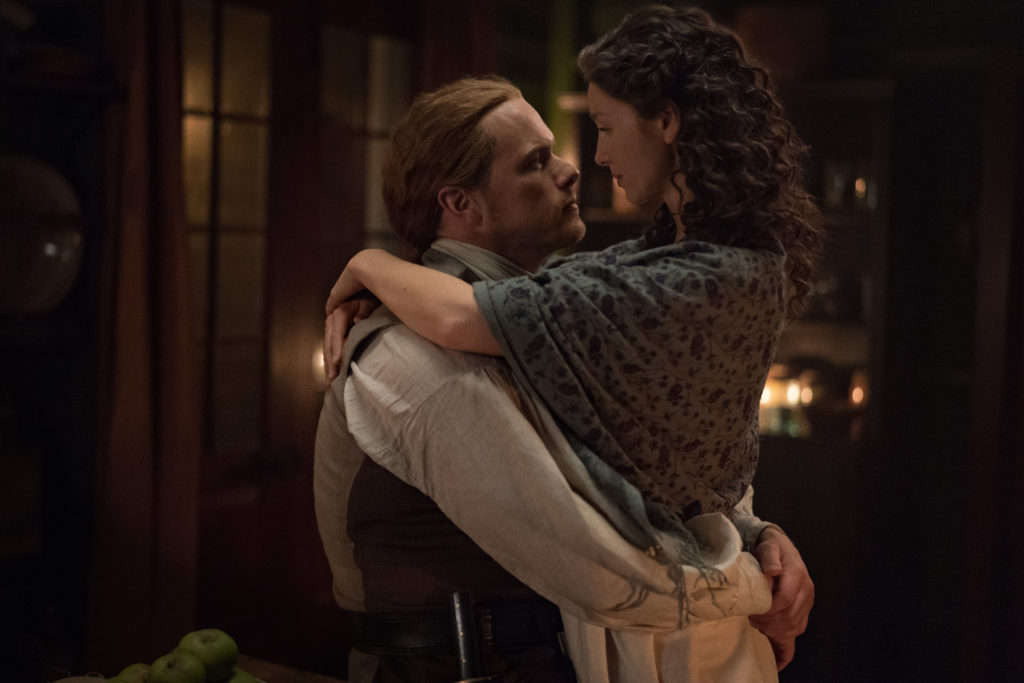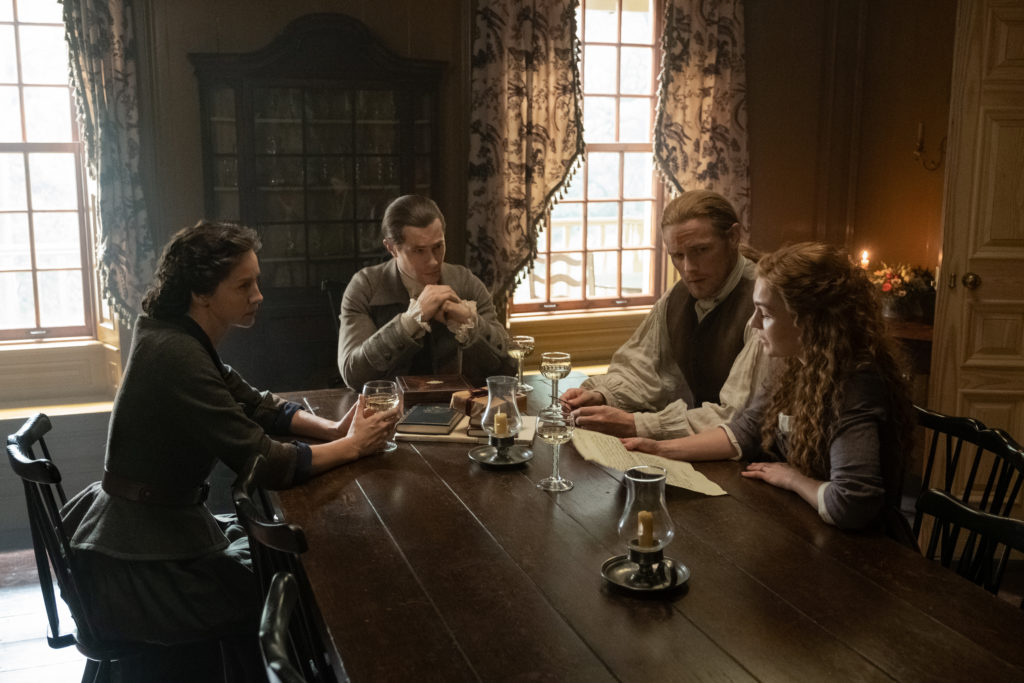[This is not a spoiler-free review of the episode. If you have not seen the episode yet, read it at your own spoiler risk.]
Episode 508: “Famous Last Words”
Written by Danielle Berrow, Directed by Stephen Woolfenden
“And I will stay up through the night
Yeah let’s be clear, I won’t close my eyes
And I know that I can survive
I walked through fire to save my life
And I want it, I want my life so bad
And I’m doing everything I can
Then another one bites the dust
It’s hard to lose a chosen one”
– Sia, “Elastic Heart” (2013)
It is difficult to watch the eighth episode of the season, “Famous Last Words,” and not think of where our society and world are right now with social distancing and new paradigms of communication and relationships. Hashtags such as #alonetogether and #flattenthecurve are meant to unite us in a shared agreement to modify our behaviors in order to combat an invisible threat that has no boundaries or victim profile. As we shelter in place, we are encouraged to reach out to friends and family and community members who may live alone through the computer and phone in fellowship and support and to conduct classes and meetings through online video and audio chats. The ultimate goal is to communicate together as much as possible while remaining physically isolated to preserve the threads of society that will help us come together again after the threat recedes, but we will never be as we were before.
The episode opens with Roger, who we last saw hanging from a tree after the Battle of Alamance, reviewing the assessments of essays with his students at Oxford in 1969 as Brianna observes from the sidelines. The theme had been to analyze the last words of a famous person and why they were meaningful. I always wondered if those famous last words of history really were the actual words that a person said after the alterations of time and culture and media. Furthermore, if there was proof of their last words, were they put into context for future generations to understand? As we’ve seen in science fiction films like Alien and horror films like Event Horizon, misunderstanding a verb or pronoun can lead to disastrous results. On a lighter note, what if it were a Seinfeld-esque situation where one’s last word is taken as profound and mysterious but really just referred to a brand of chocolate milk?
“People live and die by their words,” Professor Wakefield says, further mirroring our current situation, “they have impact…make them meaningful.” After the class is dismissed, he and Brianna agree to watch a marathon of silent movies, which transition to the structure of the episode back to that tree where we find out through dialogue panels meant to resemble a silent film that he did not die by hanging. Jamie feels him breathing, and Claire performs a field tracheotomy, which saves his life. “You’re alive,” Jamie tells Roger as he looks upon his wife and in-laws, “You’re whole. All is well.”
Three Outlander-universe decades and six years and four seasons ago, Jamie retreated to the darkness to cope with the rape of Black Jack and subsequent trauma. It took Murtagh, Father Anselm, and primarily Claire to bring him back. Roger’s near-death experience was shorter but more abrupt, enough so to almost transport him into another dimension where he is back at home but not as an active participant; rather, he responds to family and routine as an automaton, human in outward appearance but without energy or spirit. The hanging plays in his mind like a broken record, and in the brief reprieves where he doesn’t see it behind his eyelids, common household items like braided rope or creaking wood bring it up again. Amidst all this “mental noise,” he retreats into physical silence to survive; the pain of his tracheotomy scar gone, but the pressure of the scar tissue against his windpipe a constant emotional barrier that keeps the invisible bubble stable and family members at arm’s length.
Kudos to director Stephen Woolfenden and cinematographer Stijn Van der Veken for framing Roger almost claustrophobically tight, concentrating on his face while others talk over him or down to him with the best of intentions. In silent films, the dialogue is scarce since it has to be printed onto framed panels; in this episode, Woolfenden uses that to show how Roger has compartmentalized his traumatic experience into the bare minutiae of survival and the few stimuli which anchor his suppression.
As the Ridge tries to move on from Alamance, a familiar face returns, though not the same countenance as before. Young Ian (John Bell) is back from his time with the Mohawks, no longer a feisty, rascally young man but one who has aged only a few years physically but a few decades emotionally. If Roger chose his words carefully before, he seems downright chatty compared to Ian, who regards the Big House and cultivated fields of the Ridge as a former home with everything changed, and a growing extended family who care for him but are alien to the world from which he has just come. Ian is also haunted but for a different reason, one about which he tells his uncle Jamie, “I canna give you the truth of it now; I haven’t the words.”
I love how each family member does their best to reach out to Ian as they did with Roger: Claire is more practical, Jamie more endearing, Marsali pushier but in a gentle way. Ian certainly needs the bonds of family, or he would not have returned. Still, while his depression has caused him to retreat inward similar to Roger, his is an invisible prison of good rather than a prison of the familiar. For Ian, who has lost someone he deeply loved (not giving anything away), that person has become synonymous with feeling good and warm and joyous. In the after, anything that would cause him to feel good actually makes him feel bad, and that means a constant bombardment of radioactive particles – familial love, the comforts of home, kindness, laughter, physical touch – are slowly breaking him down spiritually and emotionally.
The surveying trip to plot Tryon’s land grant to the Mackenzie’s is accepted by both Roger and Ian, the former who needs to escape, the latter who needs to be released. As they work, they study each other, both recognizing shared traits and detecting true intentions. Each knows the other is at the breaking point (watch the framing in the scenes at camp, as they continue to be boxed in either my a canvas shelter or a thin woven blanket), but it takes a recognition of surrender (Ian buries his hatchet, a Native American symbol of making peace, and brews a tea from poisonous hemlock root) to cut the tension and literally break the silence. Ian chides Roger for wanting to leave a wife and child; Roger is firm on Ian to take up his weapon and fight his way out of his own darkness. The best line is when Ian confesses he doesn’t know how to do that, and Roger doesn’t give him an easy answer but rather advises him to fight, knowing that it will eventually lead to one.
I noted the different forms of verbal communication in the episode: funeral dirges, farewells, vows, cultural idioms, lullabies, terms of endearment, arcana readings, prayers, tête-à-têtes, confessionals. Then, there are the multitudinous nonverbal dialogues between spouses, friends, and fellow sufferers. There is what we say and what we mean, what is understood, and what is perceived. There are pauses and intonations and body language that can alter a message 180°. Furthermore, there are things we say that others may remember for the rest of their lives. As Aunt Jocasta tells Jamie, “How careful would we be if we kent which goodbyes were our last?” As steadfastly excellent as ever, in his brief scene Lord John (David Berry) gives Brianna an astrolabe intended for Roger, an instrument to “find our place in the world.” Many of us could use such an instrument right now, but as John advises, “We must have patience.”
NEXT WEEK, SUNDAY, APRIL 19TH AT 8 PM ET: EPISODE 509: “MONSTERS AND HEROES”
Photos and clips are courtesy of Starz.

